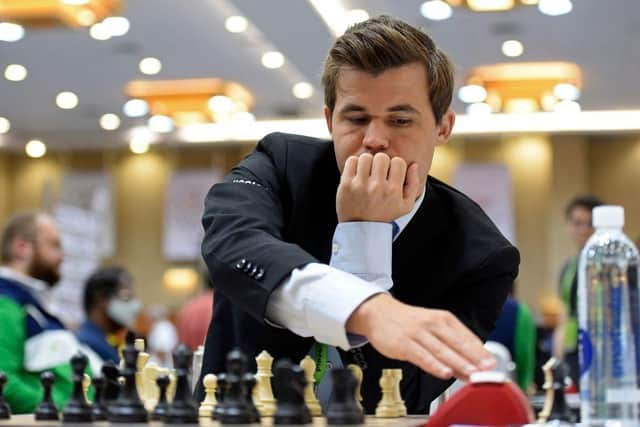How is it possible to cheat in a world class chess competition?
Two world class chess champions, a row over cheating and allegations of concealed communications pieces used during tournaments.
Now world champion Magnus Carlsen has openly accused fellow player Hans Niemann of cheating in high-level competitions following weeks of tension between the two.
Advertisement
Hide AdAdvertisement
Hide Ad"I believe that Niemann has cheated more – and more recently – than he has publicly admitted,” he said in a statement published on Twitter.


Mr Niemann, 19, has admitted cheating online twice as a young player – when he was 12 and 16 – although he insists he has never cheated in person. He has even offered to play nude to prove he is not wearing any kind of wire or earpiece. However, allegations have been made he could be wearing a concealed communications device inserted in his rectum, something that he strongly denies.
Chess.com, one of the two main online platforms used by grand masters in competition, banned Mr Niemann earlier this month, saying it had shared “information that contradicts his statements [about] the amount and seriousness of his cheating on Chess.com”. Mr Niemann’s rise in the chess world had been predominantly online, becoming popular on streaming platforms, where his games were watched by fans across the world.
Monday’s statement is the first time Norwegian Mr Carlsen, considered the greatest chess player who has ever lived, has directly accused Mr Niemann of wrongdoing, although he has hinted at it before.
This was most obviously when he walked out of a tournament earlier this month after being beaten by the teenager, ending a 53-game unbeaten run, afterwards posting a clip on social media in which football manager José Mourinho is seen saying: "If I speak, I am in big trouble.”
He also quit after just one move in a subsequent online tournament, in an apparent protest against Mr Niemann. Mr Niemann’s win against Carlsen surprised the chess world, as he was the lowest-rated player at the Sinquefield Cup, in the US city of St Louis.
Mr Carlsen added: "I'm frustrated. I want to continue to play chess at the highest level in the best events.
"I believe that cheating in chess is a big deal and an existential threat to the game. I also believe that chess organisers and all those who care about the sanctity of the game we love should seriously consider increasing security measures and methods of cheat detection for over the board chess.”
Advertisement
Hide AdAdvertisement
Hide AdThis is not the first time that allegations of cheating have been made in high-level chess. Bulgarian champion Borislav Ivanov was banned by his federation in 2013 amid claims he was using communications devices – believed to be in his shoe – to help him during games.
While online chess is more difficult to monitor – although major platforms have anti-cheating software built in and have become increasingly adept at weeding out cheats – live chess makes cheating difficult.
Players who have been found cheating in the past have relied on computers which can play near-perfect chess – and have used various methods to get the information. To utilise the computers’ ability, communication devices are used to allow the player to access move suggestions.
Jay Stockham, a former British junior chess player, told The Scotsman that top players would only need to cheat a handful of times during a game to make a difference.
He said: “They wouldn't need to check every move. If you allow a top grand master four or five opportunities to check the engine during a game, that would be enough – they can recognise critical points in the game. If you had that facility and you were already playing at that level, you could beat Magnus [Carlsen] regularly.”
Mr Stockham added: “Anyone who is doing this has to already be playing at an extremely high level. An ordinary person could not do this.”
He said the public comments of top players, following Carlsen’s actions, have made it clear cheating is surprisingly common online, with some players repetitively barred from playing on websites such as Chess.com amid suspicion of cheating.
Mr Stockham said: “There have apparently been a number of top players who have been busted for cheating online, but the online platforms do not make that information public. Often it is because they can’t be sure – it could be because they can see a pattern in how quickly they come up with brilliant moves, for example – but the online platform passes the information they have about suspected cheating to the player and asks them to explain it and, if they can’t, then they are barred for a period of time.”
Advertisement
Hide AdAdvertisement
Hide AdIn 2011, a cheating scandal hit the French chess team taking part in an Olympiad in Siberia when it was alleged that computer generated moves were passed to a coach in the room via text – who would then sit at a particular table in the competition hall to represent a pre-arranged coded move.
Some tournaments now implement extra anti-cheat measures, including delayed live streams of the event by a few minutes to ensure real-time information cannot be passed back to the competition hall and extra checks of players to ensure that they are not wearing communications devices.
When the controversy began earlier this month, Mr Niemann issued an impassioned statement, insisting he was playing fairly.
"If they want me to strip fully naked, I will do it," he said. "I don't care, because I know I am clean. You want me to play in a closed box with zero electronic transmission, I don't care. I'm here to win and that is my goal regardless."
Comments
Want to join the conversation? Please or to comment on this article.
